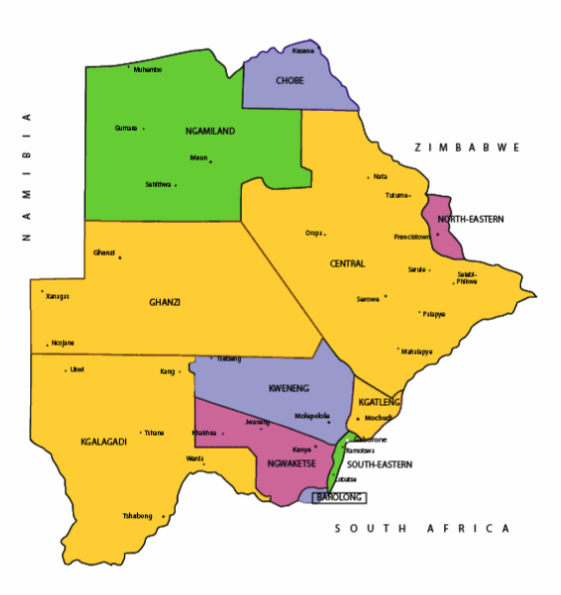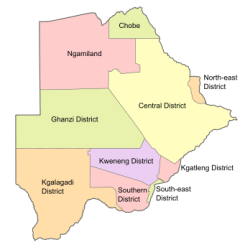Places and their polling stations in Boteti East, Botswana
221 Mmeya-Mokubilo
1106 Makgaba Mobile Stop
1107 Mokubilo Primary School
1108 Mmea Primary School
222 Mosu
1109 Mosu Primary School
1110 Nthane Mobile Stop
1111 Makgadikgadi JSS
223 Mmatshumo
1112 Mmatshumo Kgotla
1113 Makolwane Tent
1114 Tshwagong Tent
1115 Mmatshumo Primary School
224 Letlhakane North
1116 Metsiaela Kgotla
1117 Seasole Primary School
1118 Buildings Department Camp
225 Letlhakane West
1119 Bus Rank
1120 Water Unit Offices
226 Letlhakane Central
1121 Letlhakane Tribal Administration Office
1122 Letlhakane Primary School
1123 Letlhakane SSS
1124 Retlhatloleng Primary School
227 Letlhakane East
1125 Motsumi JSS
1126 Mokane Primary School
1127 Rural Administration Centre (Rac)
1128 Letlhakane Clinic
228 Letlhakane South
1129 Supang Primary School
1130 Setoto Tent
229 Khwee
1131 Khwee Primary School
1132 Kodiba Tent
1133 Chaichane Tent
1134 Goditshaa Tent
1135 Tshoswane (Tent)
2295 Mophane Tent
Reference: iec.gov.bw/index.php/electoral-districts/polling-stations.html
Botswana
Botswana is a country in Africa. It is topographically flat, with approximately 70 percent of its territory being the Kalahari Desert.
It is bordered by South Africa to the south and southeast, Namibia to the west and north, and Zimbabwe to the northeast.
Capital: Gaborone
Currency: Botswanan Pula
Official language: English
Population: 2.588 million (2021) World Bank
Dialing code: +267
Gross Domestic Product: 17.61 billion USD (2021) World Bank
Botswana’s ten districts are:
- Southern District
- South-East District
- Kweneng District
- Kgatleng District
- Central District
- North-East District
- Ngamiland District
- Kgalagadi District
- Chobe District
- Ghanzi District
Botswana’s councils created from urban or town councils are: Gaborone City, Francistown, Lobatse Town, Selebi-Phikwe Town, Jwaneng Town, Orapa Town and Sowa Township.






The name Botswana refers to ‘Land of the Tswana’. The landlocked, Southern Africa country is officially known as the Republic of Botswana.














Botswana is connected to Zambia through the Kazungula Bridge making it the world’s shortest border between two countries.
A country of slightly over 2 million people (2021), Botswana is one of the most sparsely populated countries in the world. It is essentially the nation state of the Tswana ethnic group, who make up 79% of the population.

About 11.6 per cent of the population lives in the capital and largest city, Gaborone.
Formerly one of the world’s poorest countries—with a GDP per capita of about US$70 per year in the late 1960s—it has since transformed itself into an upper-middle-income country, with one of the world’s fastest-growing economies.


The Tswana ethnic group were descended mainly from Bantu-speaking tribes who migrated southward of Africa to modern Botswana, living in tribal enclaves as farmers and herders.




In 1885, the British colonised the area and declared a protectorate under the name of Bechuanaland.
As colonisation stopped, Bechuanaland became an independent republic under its current name on 30 September 1966.


Since then, it has been a representative republic, with a consistent record of uninterrupted democratic elections and the lowest perceived corruption ranking in Africa since at least 1998.

The economy is dominated by mining and tourism. Botswana has a GDP (purchasing power parity) per capita of about $18,113 as of 2021, one of the highest in subsaharan Africa.


Botswana is the world’s biggest diamond producing country.
Its relatively high gross national income per capita gives the country a high standard of living and the third-highest Human Development Index of continental Sub-Saharan Africa (after Gabon and South Africa).
The country has been adversely affected by the HIV/AIDS epidemic. In 2002, Botswana began offering anti-retroviral drugs (ARVs) to help combat the epidemic.
Botswana is a member of the Southern African Customs Union, the Southern African Development Community, the Commonwealth of Nations, and the United Nations.
